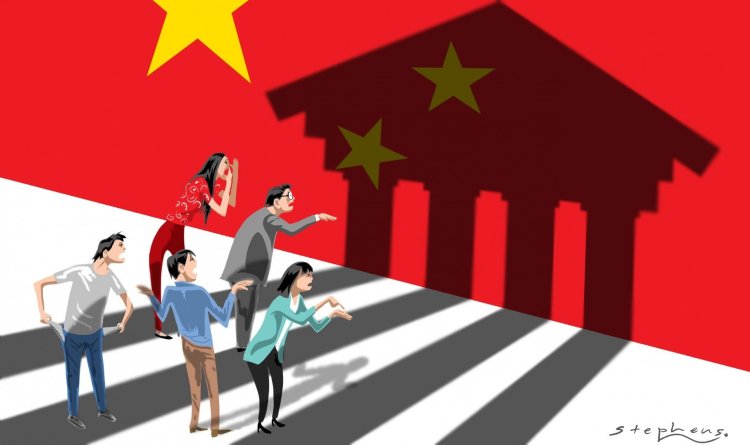Unraveling the Mystery: China's Shadow Banking Explained
Dive into "China's Shadow Banking" phenomenon. Understand its impact and implications on India's economy. A must-read for financial enthusiasts!

Unravelling the Mystery: China's Shadow Banking Explained
Welcome to our latest article where we will delve into the world of China's shadow banking system and shed light on its implications for the country's economy. You may have come across the term "shadow banking" in headlines or news reports. In this section, we will provide you with an in-depth understanding of what it means concerning China and explore its risks.
Simply put, shadow banking refers to a set of financial activities that are carried out outside the traditional banking sector. Non-bank financial institutions frequently engage in these unregulated lending and investment practises behind closed doors, shielded from the prying eyes of regulators.
While shadow banking can be found in many countries, China is notable for the sheer scale of its shadow banking system. In fact, some estimates suggest that China's shadow banking industry is worth trillions of dollars, making it a significant player in the global financial landscape.
However, the growth of China's shadow banking system has also raised concerns about its stability and the potential risks it poses to the country's economy. In recent years, China has experienced a shadow banking crisis that has highlighted the dangers of unregulated financial activities.
In the next sections, we will explore the definition of China's shadow banking system, its current state, and its risks. We will also look into non-bank financial institutions in China, the consequences of shadow banking, and the relationship between Chinese inflation and shadow banking. Additionally, we will analyse the regulatory landscape for shadow banking in China, discuss the future prospects of the industry, and assess the role of government policies in addressing the challenges posed by shadow banking.
Key Takeaways:
- China's shadow banking system refers to unregulated lending and investment practices conducted by non-bank financial institutions.
- The sheer scale of China's shadow banking industry poses potential risks to the country's economy.
- The recent shadow banking crisis in China has highlighted the dangers of unregulated financial activities.
- In the upcoming sections, we will explore the definition, risks, consequences, and future prospects of China's shadow banking system.
- We will also assess the role of government policies in addressing the challenges posed by shadow banking.
Understanding the Shadow Banking System in China
China's shadow banking system has been a topic of much debate and concern in recent years. As of 2021, the shadow banking market in China is estimated to be worth trillions of dollars, and its impact on the country's economy cannot be ignored.
Shadow banking in China is defined as a non-bank financial activity that is conducted outside of the traditional banking system. This includes lending, credit creation, investment management, and other financial services that banks typically provide. The regulatory framework for shadow banking in China has been evolving in recent years, as authorities have been working to mitigate risks and promote stability in the financial system.
In 2022, new regulations on shadow banking in China are expected to take effect, further strengthening the regulatory framework. These regulations aim to enhance the supervision and regulation of shadow banking activities, reduce financial risks, and promote the healthy development of the financial industry.
Statistics show that the shadow banking industry in China has been growing in recent years, despite efforts to curb its expansion. As of 2021, the shadow banking sector accounted for a significant portion of China's overall credit market, highlighting the need for effective regulation and oversight.
It is important to note that shadow banking in China is not necessarily illegal or fraudulent, but it does pose unique risks and challenges to the financial system. The regulatory landscape for shadow banking in China is complex, and it requires close attention from all stakeholders, including financial institutions, regulators, and investors.
Assessing the Risks of Shadow Banking in China
As India's neighbour, China's shadow banking system poses potential risks and vulnerabilities to India's economy. China's shadow banking industry operates outside of the traditional banking system, rendering it less regulated and more susceptible to risks and uncertainties.
The impact of shadow banking on China's credit market is significant. With shadow banking institutions offering loans at higher interest rates, businesses and individuals may opt for these loans instead of those from traditional lending channels. This could potentially lead to a higher default rate and increased credit risk in the financial system.
To mitigate these risks, China has implemented regulatory measures for shadow banking. The focus is on tightening regulations for non-bank financial institutions and promoting transparency in the financial system. However, challenges remain in balancing the need for financial stability while maintaining economic growth.
Liquidity risks are also a concern in China's finance sector. With shadow banking institutions operating with less capital and fewer regulations, they may be more susceptible to liquidity risk during economic downturns or financial crises.
As India and China's economies become increasingly interconnected, understanding the risks and regulatory measures surrounding China's shadow banking system is crucial for India's economic stability and growth.
Non-Bank Financial Institutions in China
China's financial system is made up of both bank and non-bank financial institutions. While banks remain the dominant players, non-bank financial institutions have gained increased importance in recent years, particularly in the shadow banking industry.
Non-bank financial institutions refer to financial institutions that are not licenced as banks but provide various financial services, including asset management, investment management, and lending. These institutions include trust companies, insurance companies, securities firms, and peer-to-peer lending platforms.
Trust companies, in particular, play a significant role in China's shadow banking system. These financial institutions operate similarly to banks, offering various financial products and services to their clients. Trusts are known for providing high-yield investments and have been used as a means of raising funds for Chinese companies.
Insurance companies also play a vital role in China's financial landscape, particularly in the pension and life insurance sectors. These companies invest heavily in the bond and equity markets, providing a significant source of funds for companies in need of capital.
Similarly, securities firms offer various financial services, including wealth management, securities trading, and investment banking. These firms serve as an alternative source of financing for companies seeking capital outside of traditional bank loans.
Lastly, peer-to-peer lending platforms have become increasingly popular in China. These platforms allow borrowers to connect with potential lenders, providing an alternative source of financing for individuals and small businesses. However, the lack of regulation and transparency in the industry has resulted in increased risks for investors and borrowers alike.
Consequences of Shadow Banking in China
When it comes to the risks associated with China's shadow banking system, the potential consequences are significant, and they could have far-reaching impacts on India's economy. The shadow banking industry in China has grown rapidly over the past decade, with the sector estimated to be worth trillions of dollars.
One of the most significant risks associated with shadow banking in China is the potential for a collapse of the Chinese economy. While this risk has yet to materialise, the massive debt burden carried by Chinese companies and local governments, combined with the opacity of the shadow banking system, is cause for concern.
Recently, the disappearance of Jack Ma, China's most prominent billionaire entrepreneur and former executive chairman of Alibaba, has raised alarm bells in the financial community. Ma's comments criticising China's financial regulatory system could have contributed to his disappearance, and this event highlights the increasing political influence of Xi Jinping over China's business landscape.
In addition to these political risks, there are also significant liquidity risks facing China's finance sector. The shadow banking industry, by its very nature, is less regulated than traditional banking, and this could lead to a situation where a sudden withdrawal of funds could cause a liquidity crunch.
Given the potential consequences of China's shadow banking system, it's important for Indian investors to stay informed on the latest developments and keep a watchful eye on the overall stability of the Chinese economy.
China's shadow banking and India's economy
If you are an Indian investor, you may be wondering about the potential impact of China's shadow banking system on your country's economy. China is one of India's biggest trade partners and investors, but the connection between the two economies goes beyond trade.
China's shadow banking industry has been a source of concern, especially after the China loan scam in India. This incident highlighted the vulnerabilities in India's financial system and raised questions about the involvement of Chinese companies in India's economy.
The risks associated with China's shadow banking system can have a trickle-down effect on other countries, including India. The interconnectedness of global financial markets means that the actions of one country's financial institutions can have far-reaching consequences.
While India has implemented measures to protect against financial risks, the potential impact of China's shadow banking on India's economy cannot be overlooked. The two countries must work together to address these risks and ensure the stability of their respective financial systems.
In summary, the connection between China's shadow banking system and India's economy is significant, and the potential risks cannot be ignored. As an Indian investor, it is essential to stay informed about developments in China's shadow banking industry and how they may impact your investment decisions.
The Chinese Real Estate Crisis and Shadow Banking
China's real estate crisis has been a topic of much discussion in recent years. The country has experienced a significant boom in its property market, with prices skyrocketing in major cities such as Beijing and Shanghai. However, a number of risks and difficulties have also come with this growth, including the part the shadow banking system has played.
Shadow banking has become a major source of funding for real estate developers in China, providing them with access to loans and capital outside of the traditional banking system. This has contributed to the growth of the real estate sector but has also created significant risks for the overall economy.
One of the main risks associated with shadow banking in the real estate sector is the potential for default. Developers who rely on shadow banking loans may be more likely to default on their debts, which can have a ripple effect throughout the economy. In addition, the lack of transparency and regulation in the shadow banking system can make it difficult to assess the true level of risk associated with these loans.
The connection between shadow banking and the real estate crisis in China has been a key concern for policymakers and investors alike. In recent years, Chinese authorities have implemented a number of measures aimed at curbing the risks associated with shadow banking in the real estate sector. These measures have included tighter regulations on the types of loans that can be made, as well as increased oversight and monitoring of the shadow banking industry.
The future of the real estate market in China remains uncertain, and the role of shadow banking in this sector will continue to be an important topic of discussion. As the Chinese government continues to implement new regulations and policies, it will be interesting to see how the real estate market evolves and what role shadow banking will play in shaping its future.
Understanding Chinese Inflation and Shadow Banking
As you may already know, inflation is the general increase in the price of goods and services in an economy over time. In China, inflation is a significant concern, and the shadow banking system has been known to influence inflation rates. Shadow banking activity can lead to an increase in the money supply, which can ultimately result in inflation.
The Chinese government has implemented various policies to curb inflation, including regulating shadow banking practices. However, as shadow banking is a complex and evolving system, it is challenging to regulate effectively. This has led to concerns about the potential inflationary effects of shadow banking in China.
Moreover, the liquidity risks associated with shadow banking can also impact inflation rates. In the event of a liquidity crisis in the shadow banking sector, the resulting credit contraction can reduce demand and lower prices, leading to deflation. On the other hand, the injection of excess liquidity into the economy can lead to an increase in demand and prices, leading to inflation.
Overall, shadow banking activity in China is closely tied to the country's inflation rates. As such, policymakers must consider the risks associated with shadow banking when implementing measures to address inflation concerns in the country.
Analysing Shadow Banking Regulations in China
If you're interested in understanding China's shadow banking system, it's important to examine the regulatory landscape. In recent years, Chinese authorities have taken measures to regulate the shadow banking sector to curb the risks associated with it.
Shadow banking regulation in China is a complex topic. The regulatory framework is constantly evolving, and it can be challenging to keep up with the latest developments. However, it's essential to stay informed to understand the risks and opportunities associated with investing in China's shadow banking industry.
In 2021, Chinese regulators introduced new measures to tackle the risks associated with shadow banking. These measures include:
- Tightening regulatory requirements for shadow banking activities, including stricter guidelines on lending practices and risk management
- Curbing speculative lending and enforcing more stringent penalties for non-compliance
- Strengthening supervision of financial institutions, particularly non-bank financial institutions
These measures demonstrate China's commitment to regulating the shadow banking industry and mitigating the risks associated with it. However, implementing these measures can be challenging, and their effectiveness remains to be seen.
Recent Developments in Shadow Banking Regulation
One recent development in shadow banking regulation is the establishment of the Financial Stability and Development Committee (FSDC) in 2017. The FSDC is responsible for coordinating financial stability policy, including regulating shadow banking activities. It has the power to issue regulations, supervise financial institutions, and impose penalties for non-compliance.
Another recent development is the introduction of the Asset Management Association of China (AMAC) in 2012. The AMAC is a self-regulatory organisation that oversees the asset management industry in China, including shadow banking activities. Its primary role is to promote the healthy development of China's asset management industry by setting industry standards and supervising member organisations.
Overall, China's efforts to regulate the shadow banking industry have been significant in recent years. While there are still risks associated with investing in shadow banking in China, regulatory measures have been put in place to mitigate these risks. As a potential investor, it's important to stay informed about the latest developments in shadow banking regulation to make informed investment decisions.
The Future of China's Shadow Banking Industry
As China's economy continues to grow, the shadow banking sector is expected to play a significant role in financing various industries. However, the Chinese government has been taking measures to curb the risks associated with shadow banking, including stricter regulations and enforcement actions.
Despite these efforts, the Chinese shadow banking industry is not going away anytime soon. In fact, it is likely to evolve and adapt to the changing economic landscape. One potential trend is the emergence of online lending platforms that use big data and artificial intelligence to assess credit risk and provide loans to small and medium-sized enterprises.
Another trend is the increasing focus on sustainable finance and green bonds, which are aimed at financing projects that have a positive environmental impact. China is already the world's largest issuer of green bonds, and this trend is expected to continue in the coming years.
However, the Chinese shadow banking industry also faces significant challenges, such as increasing regulatory scrutiny, rising defaults, and liquidity risks. It remains to be seen whether the industry can overcome these challenges and continue to play a significant role in China's economy in the coming years.
Overall, the future of China's shadow banking industry is uncertain, and it will depend on various factors such as government policies, economic trends, and technological developments. Nevertheless, it is clear that the industry will continue to be an important source of financing for Chinese companies, and it will be important for investors and policymakers alike to monitor its development in the years to come.
The Role of Government Policies in Addressing Shadow Banking
As a reader in India, you may wonder what actions the Chinese government has taken to address the risks posed by shadow banking. The ruling political party in China, the Communist Party of China (CPC), has implemented several policies in recent years to regulate this sector and curb its potential negative effects on the economy.
The Role of Xi Jinping's Administration
Under the leadership of President Xi Jinping, the CPC has made it a priority to contain risks arising from the shadow banking system. Jinping's administration has implemented a series of measures aimed at reducing financial risks and promoting sustainable growth in the finance sector. These policies have included:
- Tightening regulations on non-bank financial institutions
- Strengthening supervision of shadow banking activities
- Increasing transparency in financial transactions
- Improving risk management and control
The CPC has also established a centralised financial regulatory framework, providing better coordination between regulatory bodies and a more comprehensive approach to risk management in the financial sector.
The Impact of Government Policies
The policies implemented by the Chinese government have had a significant impact on the shadow banking industry in China. Shadow banking activities have declined since the implementation of regulations, and the risks associated with shadow banking have been reduced. Furthermore, the government's efforts to promote financial stability have helped strengthen investor confidence and encouraged sustainable growth in the finance sector.
However, challenges remain in regulating the shadow banking system. The Chinese government must continue to closely monitor the industry and adapt its policies as needed to mitigate risks and maintain financial stability.
In conclusion, the Chinese government has taken significant steps to address the risks associated with shadow banking, including tightening regulations, improving transparency, and establishing a centralised regulatory framework. While challenges remain, these policies have had a positive impact on the shadow banking industry in China and are crucial to maintaining financial stability.
Wrapping Up: Key Takeaways on China's Shadow Banking
Congratulations! You have reached the end of our comprehensive exploration of China's shadow banking system. By now, you have gained a thorough understanding of the risks and implications associated with this complex financial sector. Here are some key takeaways for you to remember:
The Risks of Shadow Banking in China
The shadow banking system in China poses a significant risk to the country's economy, particularly with regards to its credit market and liquidity risks. The regulatory measures implemented by Chinese authorities aim to mitigate these risks, but the potential consequences of shadow banking cannot be ignored.
The Significance of Non-Bank Financial Institutions
Non-bank financial institutions play a crucial role in China's shadow banking industry and the overall financial landscape. Understanding the key players and their operations is essential to comprehending the functioning of China's financial system as a whole.
The Connection between Shadow Banking and the Real Estate Crisis
Shadow banking has contributed to the instability in China's real estate market, with potential consequences for the broader economy. The current crisis highlights the need for effective regulations to prevent a potential collapse.
The Future of China's Shadow Banking Industry
The shadow banking industry in China is evolving, with changing regulatory landscapes and new emerging economic dynamics. The prospects and challenges for this sector remain uncertain, but keeping an eye on this industry can provide valuable insights into China's economic landscape.
The Role of Government Policies
The Chinese government has been implementing policies to address the risks posed by shadow banking, particularly under the leadership of Xi Jinping. These policies aim to mitigate potential consequences and ensure the stability of the financial system.
Overall, understanding China's shadow banking system and its implications is crucial for investors and policymakers alike. We hope this article has provided you with valuable insights and a comprehensive understanding of this complex financial sector.
FAQ
What is China's shadow banking system?
China's shadow banking system refers to a network of non-bank financial institutions and activities that operate outside the traditional regulated banking sector. These include activities such as peer-to-peer lending, trust loans, and wealth management products. It provides alternative channels for financing but also poses risks to the stability of China's financial system.
What are the risks associated with shadow banking in China?
Shadow banking in China carries various risks, including credit risks, liquidity risks, and regulatory risks. The lack of proper oversight and regulation can lead to the buildup of risky assets and the potential destabilisation of the financial system. Additionally, there is a risk of default and contagion effects if one institution within the shadow banking system fails.
How is shadow banking regulated in China?
To address the risks associated with shadow banking, Chinese authorities have implemented various regulatory measures. These include stricter oversight, improved disclosure requirements, and increased capital requirements for non-bank financial institutions. China's central bank, the People's Bank of China, plays a crucial role in supervising and regulating shadow banking activities.
What are the consequences of shadow banking in China?
The consequences of shadow banking in China can be far-reaching. It poses risks to the stability of the Chinese economy, including the potential for financial crises and economic downturns. The collapse of shadow banking institutions or the bursting of asset bubbles can have significant impacts on the overall economy, leading to job losses, reduced consumer spending, and decreased investor confidence.
How does shadow banking in China affect India's economy?
The interconnectedness between China and India's economies means that the risks associated with China's shadow banking system can spill over into India. Any disruptions or shocks in China's financial system can impact India's economy, particularly through trade linkages and financial flows. Therefore, India must closely monitor developments in China's shadow banking sector to mitigate any potential negative impacts.
Having said that….
You can join our Forex Managed account program and earn 1-2% profits daily. See for yourself by clicking the below link.
Have a great journey, and may you catch some big waves on your way to prosperity!
To see Ai Forex Trading for real, use these credentials
Low-risk strategy:
Mt4: 112018
PW: Allah@101
Server: tradefxp live,
To read why you should be with us, click here
To open an account, click here.
To see our regulation certificate: click here.
To see our news with the IFMRRC: click here.
For claims, click here.
For the main site: click here.
For blogs and articles: click here.
Main Website: www.TradeFxP.com



 admin
admin 










